Jurnee Smollett is no stranger to confronting the supernatural and examining what cannot be seen or even fully explained. After all, she was just 11-years-old when she starred as the title character in Eve’s Bayou, playing a precocious young girl who puts a lethal hex on her father (Samuel L. Jackson). Now she is similarly interrogating the metaphorical and literal monsters that pervade 1950s Jim Crow America as Leti Lewis on Lovecraft Country.
To hear the actress tell it, though, nothing makes her squirmier than the supernatural. “I’m not afraid of mice or snakes or spiders or anything like that, but the supernatural f**ks with my mind,” she confessed to ESSENCE. You couldn’t tell by watching her on screen. As Leti—a fiercely independent shutterbug who goes on a road trip to help reunite her friend, Atticus (Jonathan Majors), with his wayward father (The Wire‘s Michael Kenneth Williams)—Smollett has narrowly escaped horrifying beasts in the woods and necromancing White folks in a mansion.
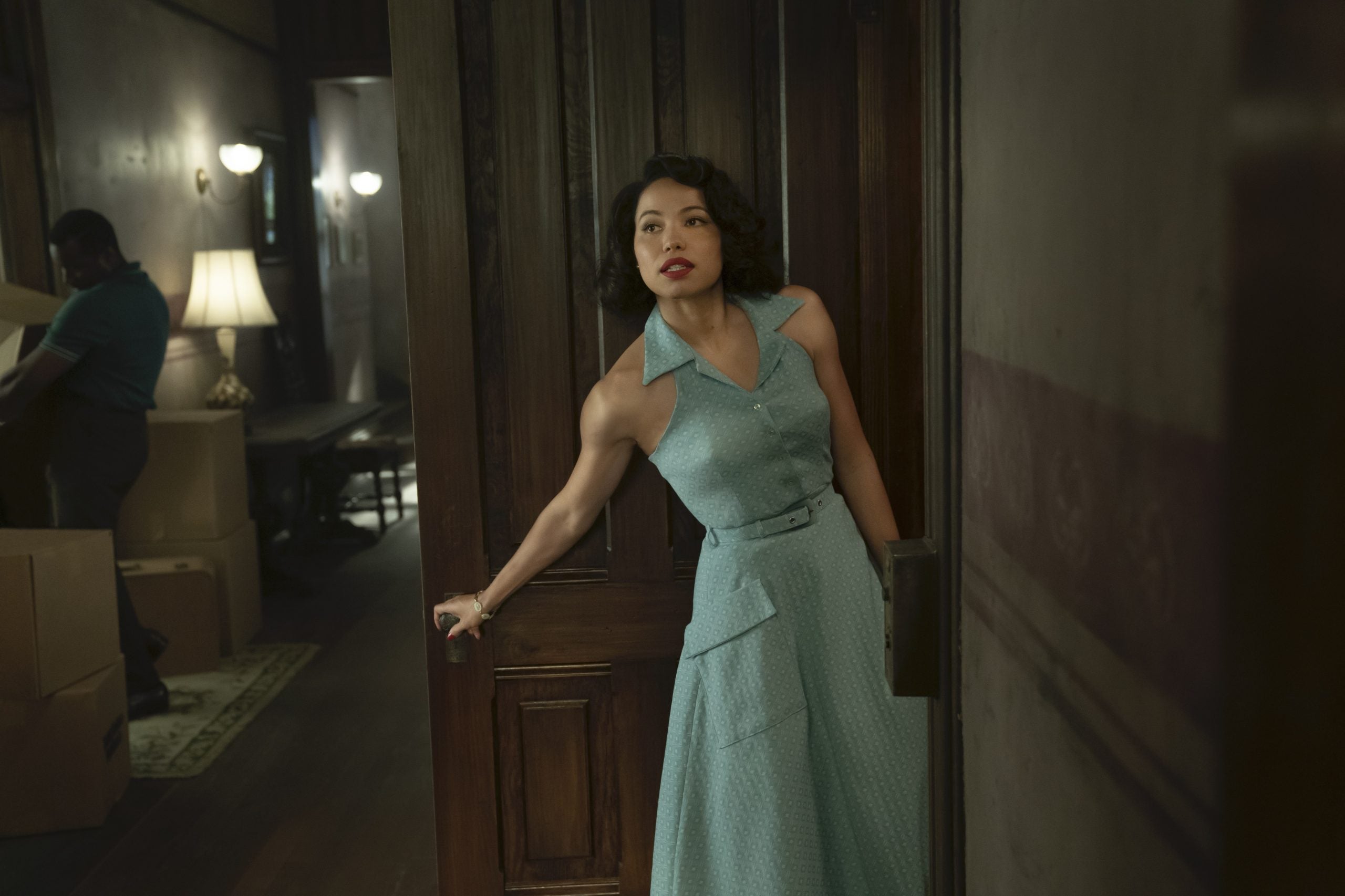
But few things compare to what she encounters in episode three of the series. Struggling to settle into her own home in a racist White neighborhood—a residence she also rents out to other Black people including her estranged sister, Ruby (Wunmi Mosaku)—Leti learns that there are eight ghosts living in her basement. And they’re the souls of Black people whose live bodies were experimented on by a white man named Winthrop. After an attempt to cleanse the house of its spirits goes awry, Atticus winds up possessed with the ghost of Winthrop, and Leti is left to fend him off with the help of the specters that are eager for retaliation.
Smollett talks to ESSENCE about embracing the supernatural, the actual demon that is systemic racism, and the courage of faith.
ESSENCE: I imagine some of what it takes to play a role like Leti may come from your own experiences as a Black woman. But was there any other research or preparation that you had to do for the role?
JURNEE SMOLLETT: A ton. It required an insane amount of research that I started a few months prior to shooting the pilot. I read the book Matt Ruff wrote, but then I did a deeper dive into the world. I just tried to fill up my spirit with as much research as I could about that era in order to meditate on what it was like to be both Black and female in the 1950s.
But honestly, the biggest inspiration for Leti was my grandmother. I grew up hearing stories about her, never met her. My mother was pregnant with my oldest brother when my grandmother passed away. I remember my mom talking about her playing cards and drinking Jack and Coke—a buoyant woman ahead of her time. She was the first Black beauty queen from Galveston, Texas, who dated these really famous men I grew up hearing rumors about it.
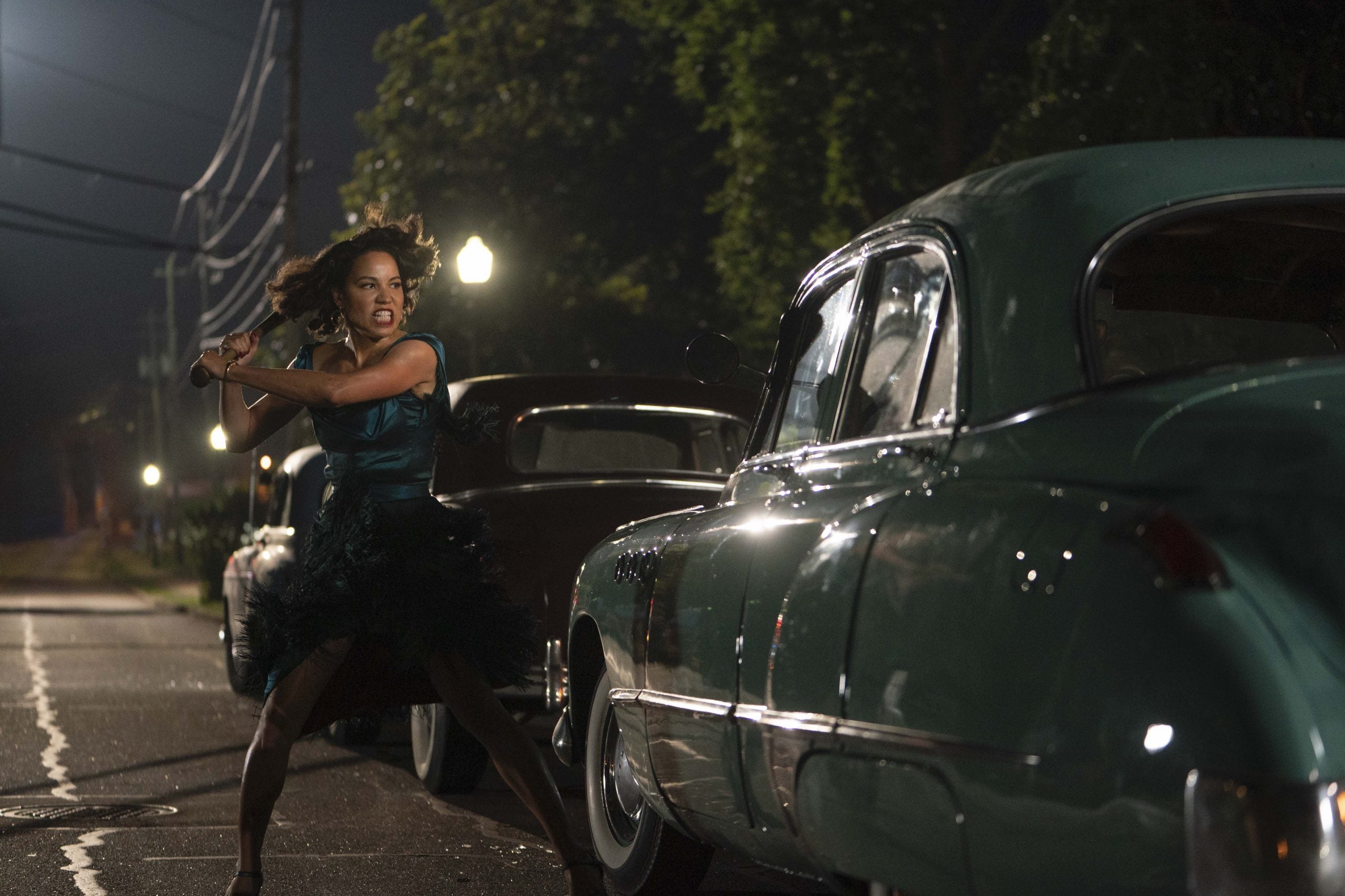
A lot like Leti, she was very self- possessed. A bit of a wanderer, she settled down in New Orleans and had four kids back-to-back. A single mom in an era when a Black woman raising four kids by herself [was] very taboo. She worked cleaning the homes of White folks, which interestingly enough Leti proclaims she’ll never do. And yet she’d go to work every day with her hair and makeup done, dress pressed, regardless of how she was mistreated or neglected or underpaid by these white families. She had an indomitable spirit, and that was her value.
In addition, [I read] Lorraine Hansberry or the writing of Gwendolyn Brooks or obviously James Baldwin. I’ve read about sundown towns and the Green Book. There were books about segregation in pools, which was very, very interesting to me. This idea, like, how do you segregate a pool—something so freeing as water?
ESSENCE: In terms of Leti’s fierce independence, which both she and your grandmother share, there seems to be a sense of loss or abandonment that is folded into it. How do you think her relationships with Ruby and Tic—as well as the mystery that engulfs them—play into her need to connect or have a purpose?
SMOLLETT: She’s inherited a lineage of trauma from her mother [and] desperately trying to heal that mother-daughter split that she experienced. She was actually abandoned by her mother. And when that happens to you at such a young age, you seek to be healed. You seek to rectify the situation in different ways. She suffers from this feeling of displacement after being chilled in episode two. She more than ever is in search of her rebirth. She just desperately wants to shed her old self, to get her sister to see her as the new Leti that she yearns to be—one who’s not selfish [and] wants to serve her community. It’s interesting because she left her home in search of a home; she left her tribe in search of a tribe [and] she left her family in search of a family.
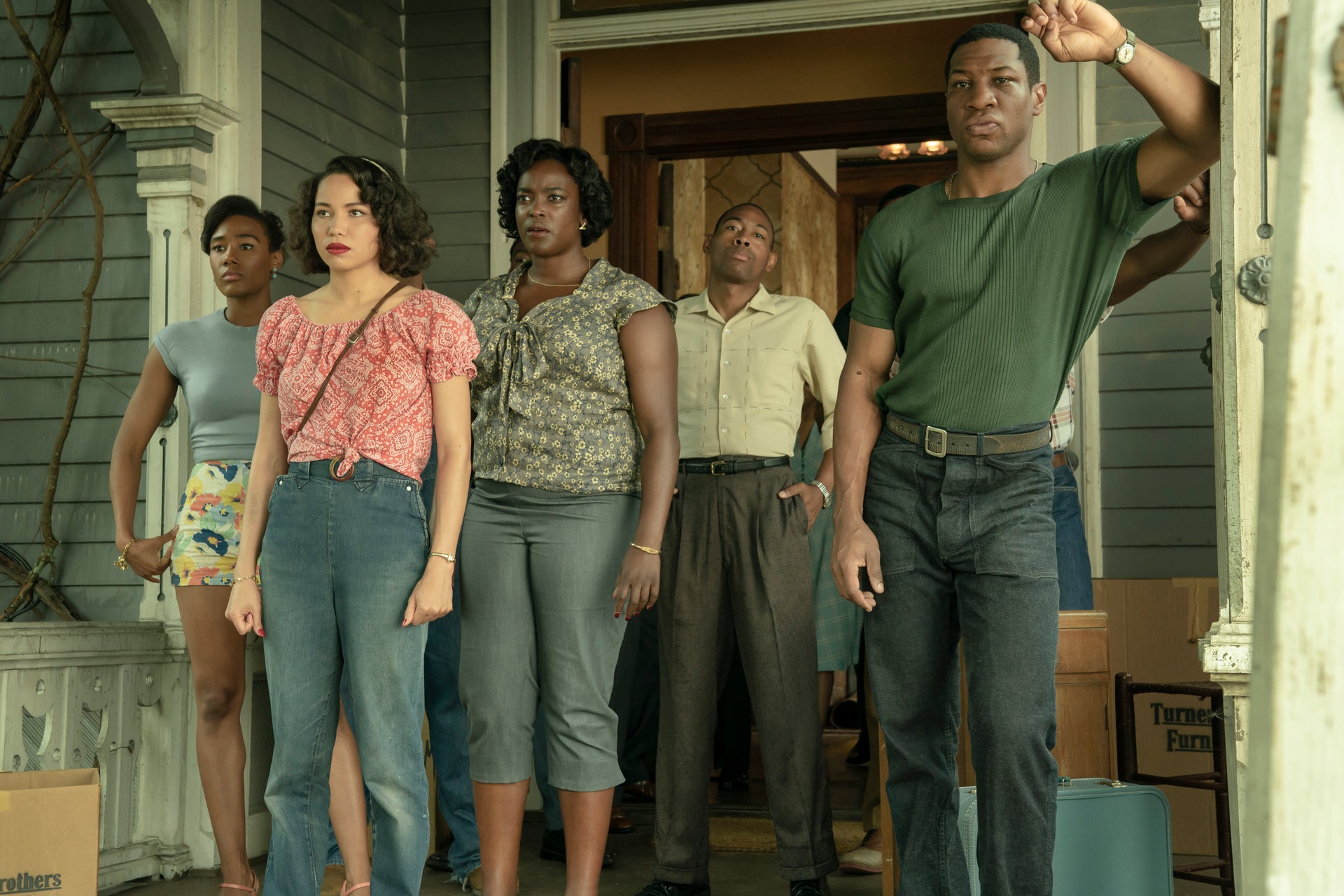
To me, a big key into Leti is the fact she didn’t go to her mother’s funeral. The need to reject her mother and everything that her mother stands for was quite revealing to me. To put her focus into serving her community is to pacify the emptiness [and] fill the void that was left from that mother-daughter split.
ESSENCE: That’s why she is so adamant about it, despite the racial opposition and danger.
SMOLLETT: This need to pioneer into an all-White neighborhood is because she suffers from this feeling of displacement. When James Baldwin Talks about the great shock that you as a Black American experience when you discover that the country to which you owe your birthplace and identity to hasn’t evolved for you. So, in trying to heal the mother-daughter split, she split from the very foundation she comes from; her mother, that blood memory. She’s split from her nation.
Then Atticus comes along. While she’s been in this pattern of sabotaging most relationships in her life and pushing people away, here comes this person that she shares this trauma bond with. They become so tied by what they’ve experienced in the first few episodes and it’s all centered in a secret. It’s very dysfunctional when the foundation of your relationship is built upon a secret. But she’s still bonded to him. And he, being Atticus doesn’t really know how to process that. He processes it in a way of rejecting her.
ESSENCE: It does create a sense of co-dependence. He nearly sacrifices himself in that terrifying scene in the basement.
SMOLLETT: The exorcism scene…
ESSENCE: Right. What was it like to shoot that scene?
SMOLLETT: On a molecular level, I felt the blood memory coursing through my veins. It was one of those rare moments you experience in your craft where everything just takes over. The story is so ancestral. In that scene, Leti not only has to perform an exorcism to get the ghosts out of her house, she has to perform an exorcism of herself to be reborn. There will be no future If I do not face my past and heal from my past; my ancestors and everything that I’ve inherited, this lineage of traumas and degradation of our bodies, this violation, systemic racism that hasn’t been dismantled. I have to free myself and my ancestors of that in this moment.
It’s hard to even really talk about. When I was doing it, it was that thing where you could feel the vibration and it just overtook me. And Jonathan is such a great scene partner.
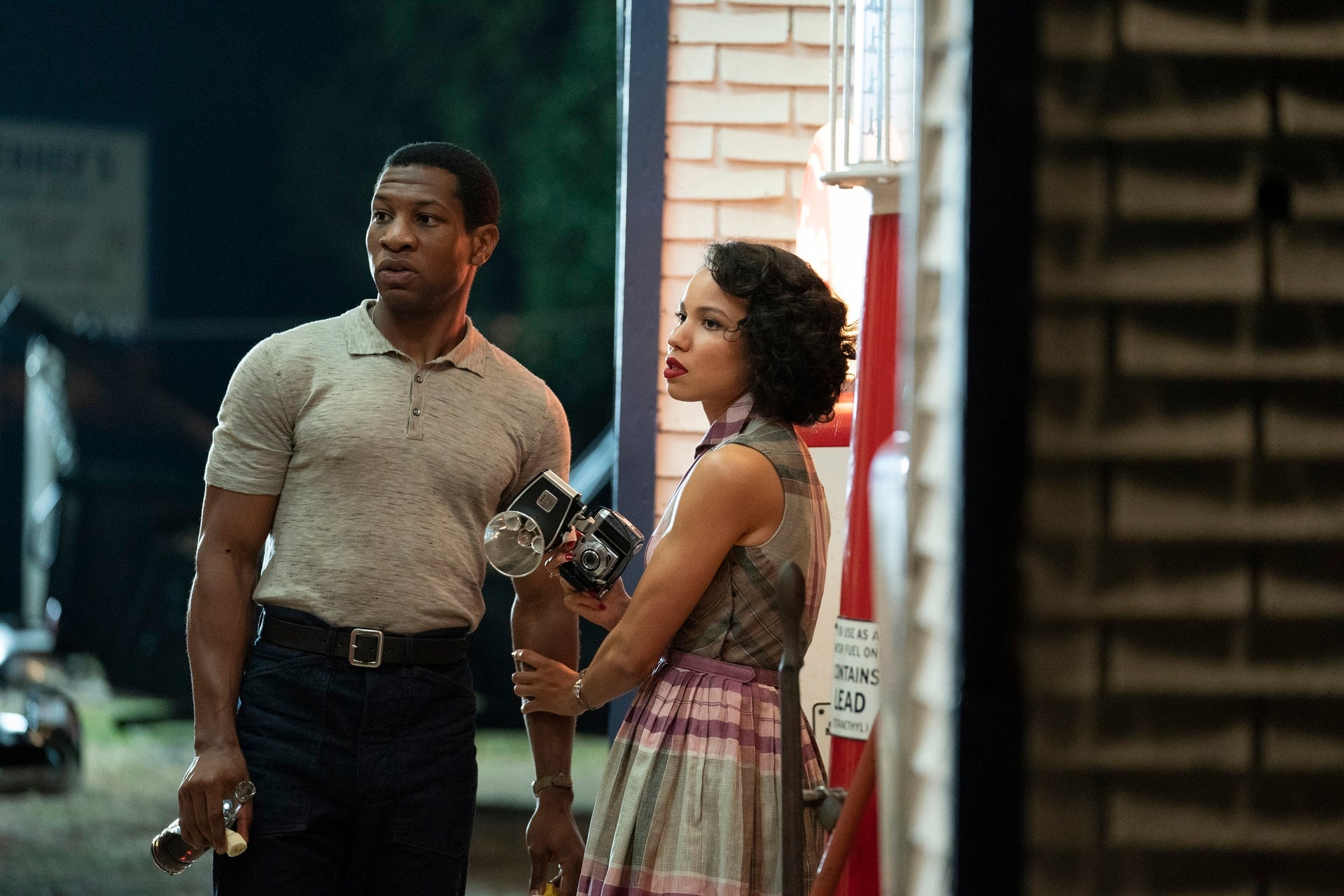
ESSENCE: He’s wicked in that scene.
SMOLLETT: Oh, he’s so wicked in that scene. We shot it over a course of three days. I shot my voice out several times. And Jonathan [got me] all this tea and honey after the first day [Laughs]. But it was just one of those moments where as an artist, you have to surrender your whole body, mind and spirit to service the text.
ESSENCE: You talked about ancestry, which is threaded throughout Lovecraft Country. But I also think that faith is a major theme. In the beginning of episode three, Leti is in church and appears almost stoic. How do you think her relationship with faith impacts her story?
SMOLLETT: It’s huge. For one, our heroes are engaged in a in a spiritual warfare. So, it’s interesting because in the church, it’s that hunger, that yearning for the Holy Spirit. She is watching this woman who’s so possessed, so filled with the Holy Spirit. [And] she’s currently not. Her mother’s faith was real. It’s yet to be real for Leti. She’s been close enough to it. When you experience death, you become aware of something greater than yourself. So, she’s in search of the baptism, she’s in search of the Holy Spirit. She’s in search of the rebirth.
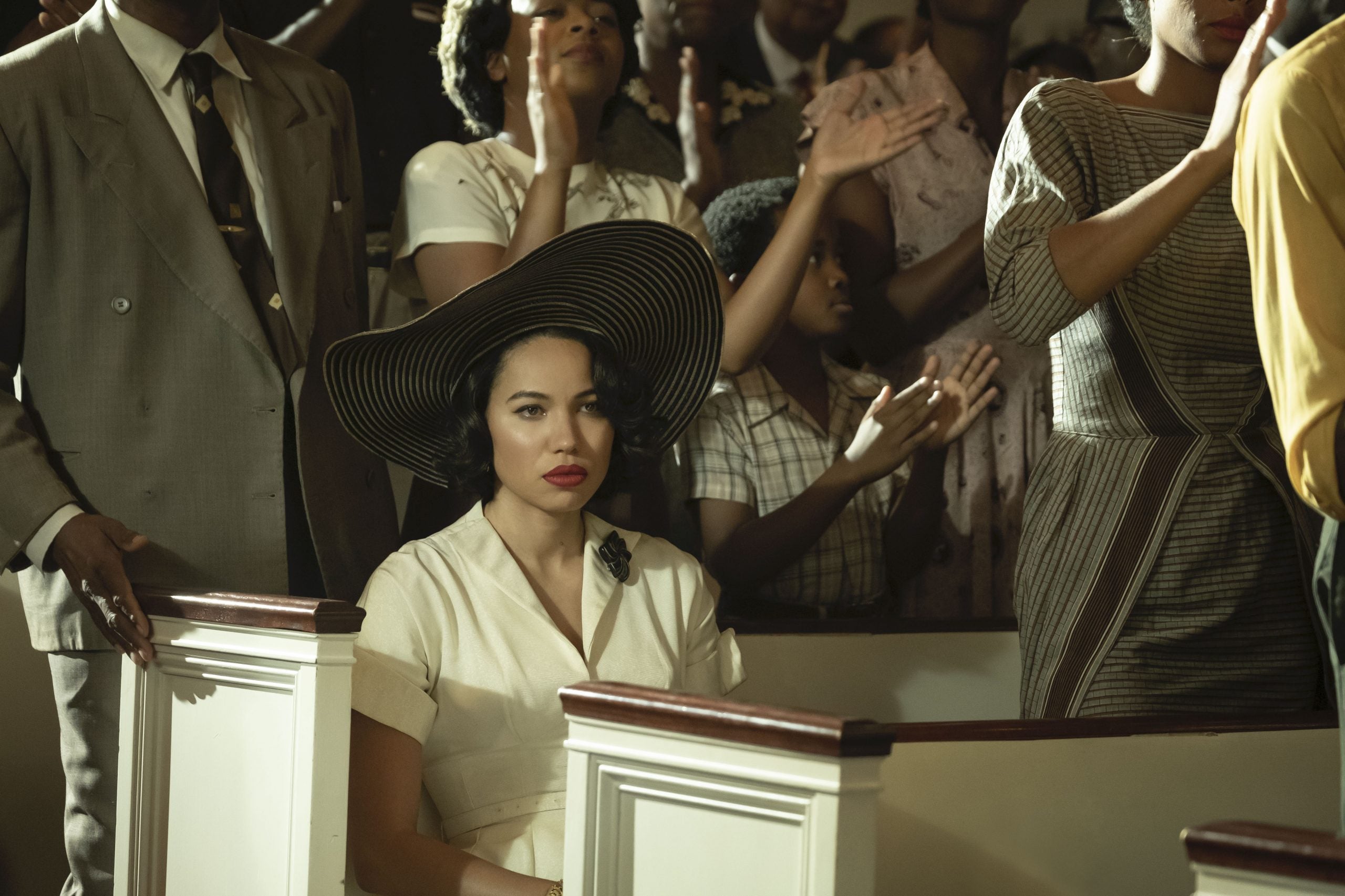
Faith becomes even a bigger part of Leti’s storyline as the season continues. It’s her search for her parents. That’s what God is. That’s what the Holy Spirit is, the search for the great comforter. All these things are so much bigger than you. How do you fight it off? If we’re magical and if you have faith and are engaged in a spiritual warfare… well, hopefully you’re on the right side. If you’ve got God on your side, there’s no one more powerful than the Almighty. So how can you tap into that when you feel that these forces on Earth are so much more powerful than you? That’s one of the reasons why she dives into that.
ESSENCE: The very fact she believes almost instantly that these are ghosts, and that she must help them, is a tremendous leap of faith.
SMOLLETT: But it’s also very courageous.
ESSENCE: Yes.
SMOLLETT: It definitely speaks to her nature. My approach to Leti was a very primal, buoyant, fluid. The logic, the reasoning, everything that should stop her from doing something won’t because her instincts are driving this engine right now.
ESSENCE: That’s very evident. You’ve helped create now two significant horror pieces, Eve’s Bayou as well as Lovecraft Country. What is it about the horror genre that draws you to it?
SMOLLETT: Oh, I’ve always been such a fan since a young age. Around the time of doing Eve’s Bayou, I’d seen Silence of the Lambs. And growing up, Jodie Foster was such a big influence on me and my work. My mom showed me films [with] Jodie Foster and stuff like that. But then watching Hannibal Lecter, my goodness, you know… I’m just curious about terror. I’m curious about fear. I’m curious about the supernatural. I’m not afraid of mice or snakes or spiders or anything like that, but the supernatural f**ks with my mind.
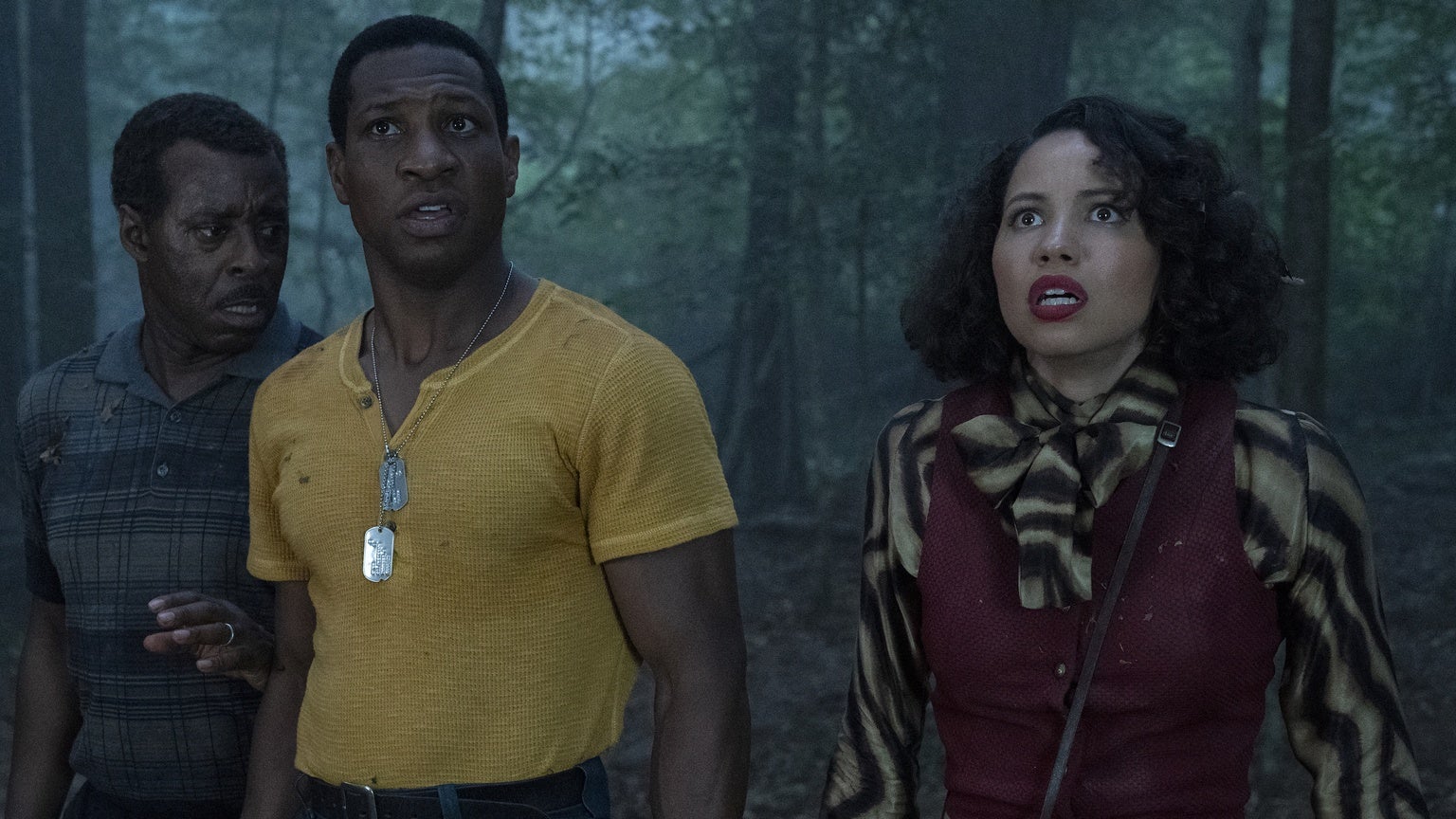
I’m just very fascinated by these other dimensions that we can’t see. When fear is weaponized… Watch out. And Black safety is something that I’m quite fascinated by as well. That’s inherent in Lovecraft Country, how fragile it is in this nation.
But I’ve always felt so frustrated because I haven’t done much in the genre of horror, thriller fantasy. There was a period when my agents were sending me so many horror films that I finally said, “Don’t you dare send me one more horror. I will not be the Black chick that they kill off on page 37 in this horror film.”
ESSENCE: [Laughs]
SMOLLETT: She’s walking down this alley and everybody and their mama know; “Don’t walk down that alley, girl.” You’re not going to have me caught out like that. No judgment against someone else who takes that role. For me, I would just be so frustrated creatively. But it’s such an exciting time because you have so many folks pioneering into this genre.
When I first read Lovecraft Country, what excited me most was this idea that you can deconstruct this classic genre and reimagine it in a very radical way. Misha [showrunner Misha Green] has such a gift for maintaining varying degrees of tone and shifting. Even though this is a genre piece, at its heart it’s a family drama—much like Eve’s Bayou.
ESSENCE: I can see that. In Eve’s Bayou, Debbi Morgan’s Mozelle Batiste Delacroix ponders divine intervention and whether there is a divine point when things happen. Do you believe in divine intervention and has it played a role in your life?
SMOLLETT: Hell, yeah. I’ve for sure witnessed what I call miracles. There have been so many times my family have been in such dangerous situations. When I was 13-years-old, I remember being in a car accident with my mom, my brother Jake and my brother Jocqui—my two younger brothers. It was raining and right before my mom was entering this freeway, before she made this right turn, I said, “Mommy, your seatbelt’s not on.”
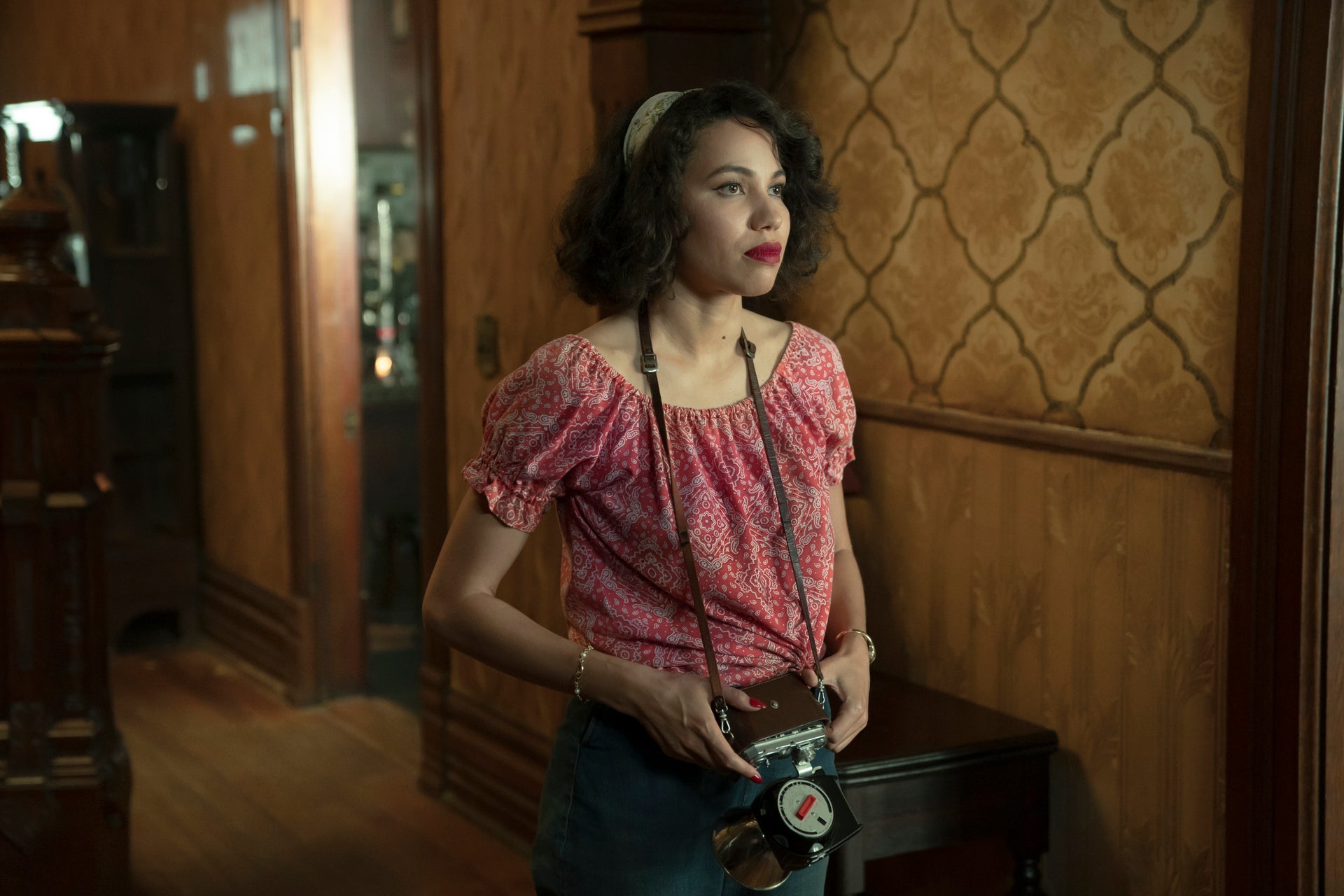
My mother never played that. I mean, she was a drill sergeant about you wearing a seatbelt. But her seatbelt wasn’t on. And I got so mad. Like, “Mommy, how is your seatbelt not….” And she quickly put her seatbelt on. Within five seconds the car flipped over, our tires burst. The car flipped off the freeway down into a ditch. It flipped three, four times and then landed back on the wheel. But it looked like a pancake.
ESSENCE: Oh, my god.
SMOLLETT: You know, when it was all said and done and we all walked out of that, I believe the Holy Spirit said, “Jurnee, look over. Your mom’s not wearing a seatbelt.” My mom would be dead. That for sure is divine intervention. I believe in the power of miracle. Giving birth to my son, man, that is witnessing a miracle. The miracle of nursing him. Anyone who’s experienced it, when you look down at your child, there’s a love, a euphoria that you feel.
ESSENCE: Lovecraft Country seems interested in exploring what the divine point is.
SMOLLETT: Without a doubt. We play with it a little more in Lovecraft Country through the metaphor, going back to the theme of spiritual warfare. When you conjure the spirits and the Holy Spirit, whether it’s the ancestors or spells—whatever the conjuring is, because it varies—it’s fascinating because it’s a dimension that we can’t see. But we’re so curious about it.
Candice Frederick (@ReelTalker) is a New York-based film and TV critic
